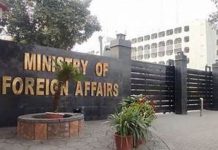UNITED NATIONS, Jul 20 (dna):Pakistan stands for boosting cooperation between the U.N. and regional and sub-regional organizations in maintaining world peace and security, a top Pakistani diplomat has said, while also stressing that no state should be allowed to dominate regional organizations.
"We must strive for a collective vision that benefits all," Ambassador Munir Akram told the UN Security Council which held a debate on Friday under the chairmanship of Russia, the 15-nation body's president for the month of July.
In this regard, the Pakistani envoy underscored that the particular national interests of member states do not hinder regional integration.
"The quest for regional hegemony by one large state has undermined the potential of the South Asian Association for Regional Cooperation (SAARC)," the Pakistani said in an obvious reference to India.
Established in 1985, SAARC (South Asian Association for Regional Cooperation) comprises: Afghanistan, Bangladesh, Bhutan, India, Maldives, Nepal, Pakistan and Sri Lanka.But India has all along been an obstacle in promoting regional cooperation through SAARC, a body established to bring prosperity to the peoples of South Asian region.
In his remarks, Ambassador Akram said, "Regional integration represents the next phase of institutional development in international relations — particularly in the realms of trade and industry.
He therefore recognized the crucial role of three bodies -- the Collective Security Treaty Organization (CSTO), the Commonwealth of Independent States (CIS), and the Shanghai Cooperation Organization (SCO) -- in fostering economic growth and cooperation across borders, as well as in combating terrorism and drug-trafficking.
Highlighting SCO's "immense promise and potential", the Pakistani envoy said that with some of the world's largest emerging economies as its members, this organization is poised to advance integrated regional cooperation, especially by enhancing trade and investment opportunities.
"This was evident at the recent SCO plus Summit meeting in Astana, in which Prime Minister of Pakistan Shehbaz Sharif participated actively," Ambassador Akram said.
In addition, he said that CSTO can enhance connectivity between the East and West, fostering a more secure region. Ambassador Akram also said that the China-Pakistan Economic Corridor is a flagship project, noting that Pakistan will expand this effort — including to Afghanistan, to reaalize its full potential for investment.
Pakistan, he said, also believes that other regional organizations such as the African Union (AU), the Economic Cooperation Organization (ECO), and Association of Southeast Asian Nations (ASEAN), along with cross-regional groups, like the Arab League and the Organization of Islamic Cooperation (OIC), should also work towards expanding global integration through appropriate association agreements, and welcomed the establishment of the AU-AL-OIC Trilateral Commission.
“Such regional and inter-regional initiatives in association within the UN are crucial for fostering greater cooperation and understanding among diverse regions, and contributing to global harmony and collective progress,” Ambassador Akram said.
He said the framework for regional integration should include:
- Adherence to the purposes and principles of the UN Charter;
- Respecting the sovereignty and territorial integrity of States;
- Preventing any one, two, or few states from dominating regional organizations or imposing their will on others in accordance with the tenets of equality, mutual respect and equity in relations among sovereign States;
- Regional cooperation should aim to provide support to less developed economies achieve their full potential, and thereby contribute to the achievement of Sustainable Development Goals (SDGs) and climate goals;
- Ensure equity and non-discrimination for all member states in the integration and regional cooperation process;
- Accord priority to promoting connectivity projects and building sustainable infrastructure to further integration, investment, trade and development, and,
- enhance the essential role of digital integration and cooperation to accelerate regional cooperation, and investment and establish the regionally and globally integrated modern economies.
“Pakistan remains committed to these objectives and looks forward to continued collaboration with the UN and with all regional and cross-regional partners,” Ambassador Akram said in conclusion.
Earlier, the Secretaries-General of SCO, CSTO and CIS told the Security Council of the need for enhanced cooperation between the United Nations and regional organizations like theirs, as Council members’ despite expressing support for regional expertise — disagreed over how increasing challenges in the Eurasian region should be addressed.
“Now, more than ever, a more effective United Nations relies on stronger and deepened cooperation with regional and subregional organizations,” said Elizabeth Spehar, Assistant Secretary-General for Peace building Support in the Department of Political and Peace building Affairs.
Detailing rising tensions and emerging threats in the Eurasian region that require joint action, she said that such organizations offer much-needed avenues for bridge-building and urged strengthened regional frameworks for dialogue and cooperation in regions where long-standing security architecture and mechanisms are collapsing or mired in stalemate.
For its part, the Shanghai Cooperation Organisation has upheld the Shanghai spirit of mutual trust, mutual benefit and respect for cultural diversity, said its Secretary-General, Zhang Ming.
Further, both traditional and non-traditional security threats should be addressed through international solidarity, which can help create a more representative and multipolar world order. Citing the UN Secretary-General, he said that the United Nations and the Shanghai Cooperation Organization are the two largest international organizations in the world, and urged, therefore, that closer cooperation between the two is critical to achieve peace and development.
Imangali Tasmagambetov, CSTO’s Secretary-General, also expressed hope for further cooperation with the UN, noting that the crisis of trust between global centres has significantly damaged the possibility of developing mutually acceptable solutions to many global security issues.
CSTO does not intend to become a counterweight to any other organization or country, he stressed, expressing support for the Russian Federation’s initiative to shape a new Eurasian architecture for security, economic and humanitarian cooperation.
Stating that today’s meeting will provide additional impetus for practical cooperation between the UN, CSTO and other organizations operating in the region, he said: “We have all possibilities to achieve this”.
Meanwhile, Sergey Lebedev, Secretary-General of CIS, underscored that cooperation with UN institutions, agencies and programmes has always been a priority for members of his organization. He also noted that CIS provides the UN with relevant information about measures to combat international terrorism, the proliferation of weapons of mass destruction and drug-trafficking.
To shape a multipolar world order, it is vital to consider the architecture of international relations, he emphasized, calling for mutually beneficial cooperation based on the legitimate interests of all States.

















